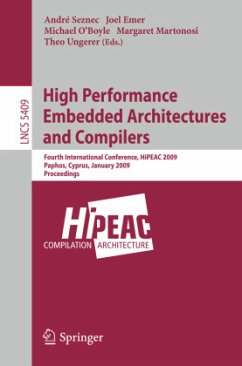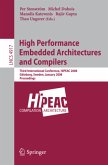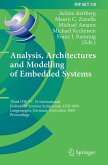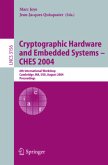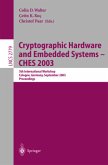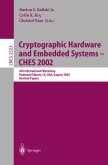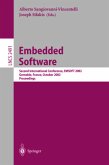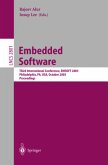André Seznec / Joel Emer / Michael et al. O'Boyle (Volume editor)Fourth International Conference, HiPEAC 2009
High Performance Embedded Architectures and Compilers
Fourth International Conference, HiPEAC 2009
Herausgegeben:Seznec, André; Emer, Joel; O'Boyle, Michael; Martonosi, Margaret; Ungerer, Theo
André Seznec / Joel Emer / Michael et al. O'Boyle (Volume editor)Fourth International Conference, HiPEAC 2009
High Performance Embedded Architectures and Compilers
Fourth International Conference, HiPEAC 2009
Herausgegeben:Seznec, André; Emer, Joel; O'Boyle, Michael; Martonosi, Margaret; Ungerer, Theo
- Broschiertes Buch
- Merkliste
- Auf die Merkliste
- Bewerten Bewerten
- Teilen
- Produkt teilen
- Produkterinnerung
- Produkterinnerung
This book constitutes the refereed proceedings of the Fourth International Conference on High Performance Embedded Architectures and Compilers, HiPEAC 2009, held in Paphos, Cyprus, in January 2009. The 27 revised full papers presented together with 2 invited keynote paper were carefully reviewed and selected from 97 submissions. The papers are organized in topical sections on dynamic translation and optimisation, low level scheduling, parallelism and resource control, communication, mapping for CMPs, power, cache issues as well as parallel embedded applications.
Andere Kunden interessierten sich auch für
![High Performance Embedded Architectures and Compilers High Performance Embedded Architectures and Compilers]() Per Stenström / Michel Dubois / Manolis Katevenis / Rajiv Gupta / Theo Ungerer (eds.)High Performance Embedded Architectures and Compilers39,99 €
Per Stenström / Michel Dubois / Manolis Katevenis / Rajiv Gupta / Theo Ungerer (eds.)High Performance Embedded Architectures and Compilers39,99 €![Analysis, Architectures and Modelling of Embedded Systems Analysis, Architectures and Modelling of Embedded Systems]() Analysis, Architectures and Modelling of Embedded Systems77,99 €
Analysis, Architectures and Modelling of Embedded Systems77,99 €![Cryptographic Hardware and Embedded Systems - CHES 2004 Cryptographic Hardware and Embedded Systems - CHES 2004]() Marc Joye / Jean-Jaques Quisquater (eds.)Cryptographic Hardware and Embedded Systems - CHES 200441,99 €
Marc Joye / Jean-Jaques Quisquater (eds.)Cryptographic Hardware and Embedded Systems - CHES 200441,99 €![Cryptographic Hardware and Embedded Systems -- CHES 2003 Cryptographic Hardware and Embedded Systems -- CHES 2003]() WalterCryptographic Hardware and Embedded Systems -- CHES 200341,99 €
WalterCryptographic Hardware and Embedded Systems -- CHES 200341,99 €![Cryptographic Hardware and Embedded Systems - CHES 2002 Cryptographic Hardware and Embedded Systems - CHES 2002]() KaliskiCryptographic Hardware and Embedded Systems - CHES 200241,99 €
KaliskiCryptographic Hardware and Embedded Systems - CHES 200241,99 €![Embedded Software Embedded Software]() Alberto Sangiovanni-Vincentelli / Joseph Sifakis (eds.)Embedded Software41,99 €
Alberto Sangiovanni-Vincentelli / Joseph Sifakis (eds.)Embedded Software41,99 €![Embedded Software Embedded Software]() Rajeev Alur / Insup Lee (eds.)Embedded Software41,99 €
Rajeev Alur / Insup Lee (eds.)Embedded Software41,99 €-
-
-
This book constitutes the refereed proceedings of the Fourth International Conference on High Performance Embedded Architectures and Compilers, HiPEAC 2009, held in Paphos, Cyprus, in January 2009. The 27 revised full papers presented together with 2 invited keynote paper were carefully reviewed and selected from 97 submissions. The papers are organized in topical sections on dynamic translation and optimisation, low level scheduling, parallelism and resource control, communication, mapping for CMPs, power, cache issues as well as parallel embedded applications.
Produktdetails
- Produktdetails
- Theoretical Computer Science and General Issues 5409
- Verlag: Springer / Springer Berlin Heidelberg / Springer, Berlin
- Artikelnr. des Verlages: 12601547, 978-3-540-92989-5
- 2009
- Seitenzahl: 436
- Erscheinungstermin: 12. Januar 2009
- Englisch
- Abmessung: 235mm x 155mm x 24mm
- Gewicht: 656g
- ISBN-13: 9783540929895
- ISBN-10: 3540929894
- Artikelnr.: 25700825
- Herstellerkennzeichnung Die Herstellerinformationen sind derzeit nicht verfügbar.
- Theoretical Computer Science and General Issues 5409
- Verlag: Springer / Springer Berlin Heidelberg / Springer, Berlin
- Artikelnr. des Verlages: 12601547, 978-3-540-92989-5
- 2009
- Seitenzahl: 436
- Erscheinungstermin: 12. Januar 2009
- Englisch
- Abmessung: 235mm x 155mm x 24mm
- Gewicht: 656g
- ISBN-13: 9783540929895
- ISBN-10: 3540929894
- Artikelnr.: 25700825
- Herstellerkennzeichnung Die Herstellerinformationen sind derzeit nicht verfügbar.
Prof. Dr. Theo Ungerer ist Professor für Systemnahe Informatik mit Schwerpunkt Kommunikationssysteme und Internet-Anwendungen am Institut für Informatik der Universität Augsburg. Zudem ist er wissenschaftlicher Direktor des Rechenzentrums und Mitglied des Lenkungsrates des IT-Servicezentrums der Universität Augsburg.
Seine wissenschaftlichen Interessen gelten den Gebieten der Prozessorarchitektur sowie der eingebetteten und ubiquitären Systeme. Theo Ungerer hat über 150 wissenschaftliche Publikationen und 6 Fachbücher veröffentlicht. Er ist Mitglied des Lenkungsrates und deutscher Koordinator des EU-Exzellenznetzwerkes HiPEAC- High Performance Embedded Architectures and Compilers
Seine wissenschaftlichen Interessen gelten den Gebieten der Prozessorarchitektur sowie der eingebetteten und ubiquitären Systeme. Theo Ungerer hat über 150 wissenschaftliche Publikationen und 6 Fachbücher veröffentlicht. Er ist Mitglied des Lenkungsrates und deutscher Koordinator des EU-Exzellenznetzwerkes HiPEAC- High Performance Embedded Architectures and Compilers
Invited Program.- Keynote: Challenges on the Road to Exascale Computing.- Keynote: Compilers in the Manycore Era.- I Dynamic Translation and Optimisation.- Steal-on-Abort: Improving Transactional Memory Performance through Dynamic Transaction Reordering.- Predictive Runtime Code Scheduling for Heterogeneous Architectures.- Collective Optimization.- High Speed CPU Simulation Using LTU Dynamic Binary Translation.- II Low Level Scheduling.- Integrated Modulo Scheduling for Clustered VLIW Architectures.- Software Pipelining in Nested Loops with Prolog-Epilog Merging.- A Flexible Code Compression Scheme Using Partitioned Look-Up Tables.- III Parallelism and Resource Control.- MLP-Aware Runahead Threads in a Simultaneous Multithreading Processor.- IPC Control for Multiple Real-Time Threads on an In-Order SMT Processor.- A Hardware Task Scheduler for Embedded Video Processing.- Finding Stress Patterns in Microprocessor Workloads.- IV Communication.- Deriving Efficient Data Movement from Decoupled Access/Execute Specifications.- MPSoC Design Using Application-Specific Architecturally Visible Communication.- Communication Based Proactive Link Power Management.- V Mapping for CMPs.- Mapping and Synchronizing Streaming Applications on Cell Processors.- Adapting Application Mapping to Systematic Within-Die Process Variations on Chip Multiprocessors.- Accomodating Diversity in CMPs with Heterogeneous Frequencies.- A Framework for Task Scheduling and Memory Partitioning for Multi-Processor System-on-Chip.- VI Power.- Hybrid Super/Subthreshold Design of a Low Power Scalable-Throughput FFT Architecture.- Predictive Thermal Management for Chip Multiprocessors Using Co-designed Virtual Machines.- HeDGE: Hybrid Dataflow Graph Execution in the Issue Logic.- Compiler Controlled Speculationfor Power Aware ILP Extraction in Dataflow Architectures.- VII Cache Issues.- Revisiting Cache Block Superloading.- ACM: An Efficient Approach for Managing Shared Caches in Chip Multiprocessors.- In-Network Caching for Chip Multiprocessors.- VIII Parallel Embedded Applications.- Parallel LDPC Decoding on the Cell/B.E. Processor.- Parallel H.264 Decoding on an Embedded Multicore Processor.
Invited Program.- Keynote: Challenges on the Road to Exascale Computing.- Keynote: Compilers in the Manycore Era.- I Dynamic Translation and Optimisation.- Steal-on-Abort: Improving Transactional Memory Performance through Dynamic Transaction Reordering.- Predictive Runtime Code Scheduling for Heterogeneous Architectures.- Collective Optimization.- High Speed CPU Simulation Using LTU Dynamic Binary Translation.- II Low Level Scheduling.- Integrated Modulo Scheduling for Clustered VLIW Architectures.- Software Pipelining in Nested Loops with Prolog-Epilog Merging.- A Flexible Code Compression Scheme Using Partitioned Look-Up Tables.- III Parallelism and Resource Control.- MLP-Aware Runahead Threads in a Simultaneous Multithreading Processor.- IPC Control for Multiple Real-Time Threads on an In-Order SMT Processor.- A Hardware Task Scheduler for Embedded Video Processing.- Finding Stress Patterns in Microprocessor Workloads.- IV Communication.- Deriving Efficient Data Movement from Decoupled Access/Execute Specifications.- MPSoC Design Using Application-Specific Architecturally Visible Communication.- Communication Based Proactive Link Power Management.- V Mapping for CMPs.- Mapping and Synchronizing Streaming Applications on Cell Processors.- Adapting Application Mapping to Systematic Within-Die Process Variations on Chip Multiprocessors.- Accomodating Diversity in CMPs with Heterogeneous Frequencies.- A Framework for Task Scheduling and Memory Partitioning for Multi-Processor System-on-Chip.- VI Power.- Hybrid Super/Subthreshold Design of a Low Power Scalable-Throughput FFT Architecture.- Predictive Thermal Management for Chip Multiprocessors Using Co-designed Virtual Machines.- HeDGE: Hybrid Dataflow Graph Execution in the Issue Logic.- Compiler Controlled Speculationfor Power Aware ILP Extraction in Dataflow Architectures.- VII Cache Issues.- Revisiting Cache Block Superloading.- ACM: An Efficient Approach for Managing Shared Caches in Chip Multiprocessors.- In-Network Caching for Chip Multiprocessors.- VIII Parallel Embedded Applications.- Parallel LDPC Decoding on the Cell/B.E. Processor.- Parallel H.264 Decoding on an Embedded Multicore Processor.

